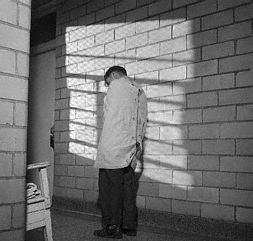

Origins, History, and VisionSubmitted by admin on Tue, 02/20/2007 - 12:14
About Us
In the years since then we have established weekly support groups, where as many as 15-20 people gather to share stories of frustration and hope, recommend resources and recovery strategies, and plan our educational and advocacy campaigns for change. Our groups are entirely peer run, and allow people to speak openly about their experiences and share rage and pain in ways impossible in groups run by mental health professionals. We've also offered the area's only completely free weekly yoga class every monday for more than a year, serving as a real example of the kinds of alternatives that need to be made available to all. More and more people contact us for support and advocacy help, and our activist campaigns are making an impact. We help people avoid being hospitalized - at a cost of thousands of dollars and risk of further abuse. We've matched clients with peer advocates to meet with doctors and push for improvements and true choice in their medication; encouraged clients to press human rights complaints and stand up for their rights, helped connect clients facing violations with lawyers and resources. We're alerting the community to forced drugging with debilitating psych meds, including widespread media coverage. We intervened at a run-down local mental health residency where clients received substandard treatment in violation of MA law. We intitiated a reform campaign against upper management policies at ServiceNet, a huge local mental health service provider, pushing for changes after we heard repeated stories of abuse and mistreatment. Residents there report significant improvements since we began to protest. We brought author Robert Whitaker to a local event with more than 80 people, and the following year brought Dr. Loren Mosher to an event with 150+ people -- including two rush-hour interviews on local NPR affiliate radio station WFCR reaching thousands. We co-sponsored a weekly film series at Mt. Holyoke college with rare documentaries on mental health and the survivors' movement. Our regular Speak-Outs on Psychiatric Abuse break the silence and prompt audience members to join in and tell their own stories of mistreatment. We've spoken at college and high school classes, to the press and at information tables on the street. Our work has received awards from the Smith College Social Work school graduating class of 2003 and the psychology students association at Mt. Holyoke College, as well as receiving multiple grants from public and private sources. Our successes show that the time is right for our movement to advance. To live with the label of 'severe mental illness' in America is to be condemned to a second class citizenship of life at the margins and the shadows. Our rights are routinely violated by doctors and helping professionals who inflict emotional abuse and physical violence on us in the name of 'treatment.' Despite the courageous reform efforts begun by mental patients and their supporters in the early 1970s, today people labeled 'mentally ill' still face widespread mistreatment, discrimination, and dehumanization. Service agencies routinely treat people in severe emotional distress as if we were criminals or misbehaving children; everyone in the Freedom Center has a story to tell of physical and verbal abuse, coercion, and disrespect. Instead of effective holistic alternatives and social supports, we are pushed - often against our will and rarely with truly informed consent - to take toxic medications based on dubious science and with questionable efficacy. The severely debilitating and even brain-damaging side effects often turn 'recovery' into an impossibility. As Pulitzer-nominated Boston Globe journalist Robert Whitaker wrote in Mad in America, "…we have made antipsychotic drugs the cornerstone of our care for the past 50 years, and the long-term results have been dismal…. Harvard Medical School researchers announced in 1994 that outcomes for US schizophrenia patients had worsened during the past 20 years and were now no better than they were at the start of the 20th century."  Most people in the Freedom Center were told that we could not recover from our 'illness,' which was genetic and inescapable - despite the fact that large numbers of people are diagnosed with severe mental illness and in fact go on to lead lives completely free of any symptoms. We were told our problems are caused by 'chemical imbalances' in our brains that are genetic in origin (that we are, in effect, inferior sub-humans), and that we have to take medication to "correct" these imbalances "like a diabetic needs to take insulin." Despite the widespread belief in this "biomedical model" of the causes of mental illness (and the huge profit it earns for pharmaceutical companies), it remains an unproven theory. The causes of 'mental illness' and its extreme suffering in fact remain mysterious -- and, above all, unique to every individual. There is growing evidence that recovery rates are higher for people who avoid psychiatric medication altogether, and many people discover relief through exercise, nutrition, alternative and holistic healthcare that treats the whole mind and body. Everyone is different and can, with support, find a healthy path to recovery. And of course, the best way to avoid psychiatric abuse may be to avoid the psychiatric system itself. Is the Freedom Center against medications?No. Many of our members take some kind of psychiatric medication. We believe in personal choice and empowerment as opposed to paternalism and control. We believe individuals should, with support and true informed consent, find out what works best for them. We believe that the existing 'informed consent' of the psychiatric system is basically a sham. For informed consent to be authentic, everyone should have access to accurate information about 'mental illness' and the real nature and toxicity of psychiatric drugs; that real alternatives to drugs should be funded and available; and that people should be actively helped to reduce and or go off psych drugs if that is what they want. As Mad In America details, psych drugs do not 'correct chemical imbalances' -- they disable brain functioning and can lead to worsened psychiatric symptoms. The science behind psych meds is corrupted by drug company money, and studies show placebos (sugar pills), counseling, social supports and alternatives are more effective and safer. Medical doctors and pharmaceutical companies must stop spreading misleading and fraudulent propaganda about psych meds and start telling the truth about how dangerous, ineffective, and often counterproductive they can be. Doctors should stop pushing meds -- even putting people on six, seven, or eight different drugs at once. This is abuse.Do you believe that mental illness is a 'myth'?Not necessarily. Suffering is real, and people do need help if they want it. However, as Mad In America details, it is a (highly lucrative) myth to assert that mental illness has proven biological causes in the brain just like Alzheimer's disease. The claim that psychiatric medications "correct chemical imbalances" is also falsehood -- medications are general tranquilizers or stimulants that will affect anyone who takes them, not specific correctives for brain diseases (veterinarians use neuroleptics to tranquilize animals). A careful look at the medical literature itself clearly shows this. For example, as the recent Fast for Freedom pointed out, Mental Health: A Report of the Surgeon General (1999) says:p. 51: "All too frequently a biological change in the brain (a lesion) is purported to be the 'cause' of a mental disorder … [but] The fact is that any simple association - or correlation - cannot and does not, by itself, mean causation." p. 102: "Few lesions or physiologic abnormalities define the mental disorders, and for the most part their causes remain unknown." The Textbook of Clinical Psychiatry (Third Edition, 1999) also states: p. 43: "Although reliable criteria have been constructed for many psychiatric disorders, validation of the diagnostic categories as specific entities has not been established." p. 51: Most of these [genetic studies] examine candidate genes in the serotonergic pathways, and have not found convincing evidence of an association." Andreasen and Black's Introductory Textbook of Psychiatry (2001), states: p. 23. "In the areas of pathophysiology and etiology, psychiatry has more uncharted territory than the rest of medicine...Much of the current investigative research in psychiatry is directed toward the goal of identifying the pathophysiology and etiology of major mental illnesses, but this goal has been achieved for only a few disorders (Alzheimer's disease, multi-infarct dementia, Huntington's disease, and substance-induced syndromes such as amphetamine-related psychosis or Wernicke-Korsakoff syndrome)." p. 231: "In the absence of visible lesions and known pathogens, investigators have turned to the exploration of models that could explain the diversity of symptoms through a single cognitive mechanism." p. 450: "Many candidate regions [of the brain] have been explored [for schizophrenia] but none have been confirmed." We are a diverse group with many stories and paths of recovery. We believe in respecting self-determination and honoring uniqueness. We encourage everyone to discover what works for them. Each of us is seeking a personal understanding of our inner suffering -- such as the injuries of child abuse and trauma; isolation and need for social support; shamanic transformation; political oppression; unsupported creativity; and holistic health (acupuncture, ayurveda, yoga, herbalism, and homeopathy use the body's own natural abilities to recover balance and wholeness). A very high percentage of the people we know labeled 'mentally ill' are survivors of some kind of physical, sexual, and or emotional abuse in childhood. Many people called 'mentally ill' believe there is nothing wrong with them at all -- except being labeled and hassled by the mental health system. Most of us have recieved a label without our consent, a label that degrades and disempowers us. Once you are labelled, you lose rights that most Americans take for granted. We've seen local people lose their freedom for months just because they annoyed a neighbor or became a nuisance to mental health staff. The police routinely haul people off to Cooley Dickinson by force just because they have a psychiatric label and are acting weird in public. If someone tells the police you are "off your meds," it is likely to stir up fears of violence and justify forced detainment without due process for behaviors tolerated in people not mentally labeled. This maddening injustice makes many ex-patients seethe with rage at a society that doesn't understand what it is doing to people --> Are you a radical group? Psychiatry and the mental health system have become deeply entrenched socially and economically. To speak the truth and challenge basic assumptions means being treated like you are too radical. Many of us are very angry about how the system has treated us. Many of us are deeply frustrated at the widespread hypocrisy of a helping profession, including psychotherapy, that rarely utters a word about the violence of involuntary treatment, restraints, medication side effects, electroshock therapy, and degrading labels. Too often we are met with words of understanding and pity -- and inaction. Too often we are told that we are angry because we are "crazy" or "unreasonable." People must learn to validate, respect, and listen to our experiences -- including our anger. We won't be quiet anymore. The movement for human rights in mental health is growing internationally. As activists we are strongly commited to nonviolence. We recognize that psychiatrists, nurses, and mental health staff are often trapped in ignorance or bureaucracies, and we reach out to the people on the "other side" with compassion and an attempt to get them to understand and join us. Respect for our opponents -- who are often also suffering -- is essential. We welcome the growing number of mental health professionals, counselors, staff and system employees who are becoming allies and working with us towards common goals -- people in the system are often oppressed as well. We believe in directly challenging abuse and advocating against institutional power, as well as educating the public, as means for change. ( categories: )
|
|